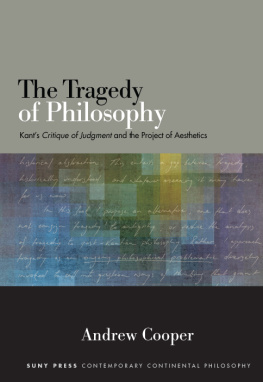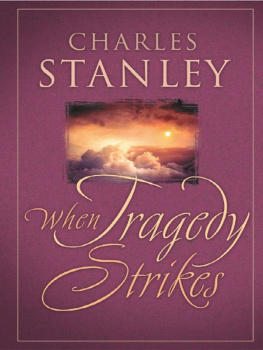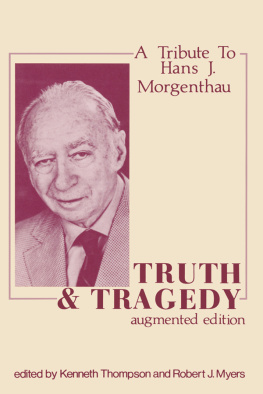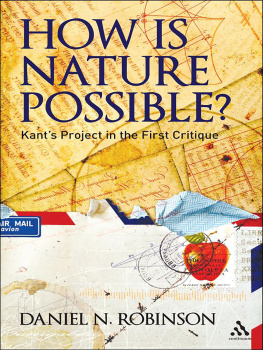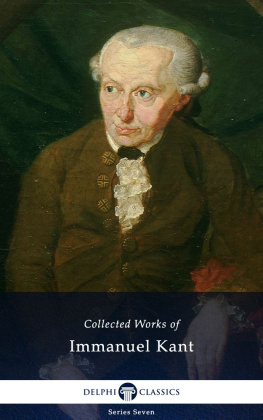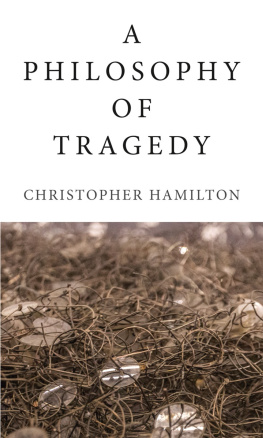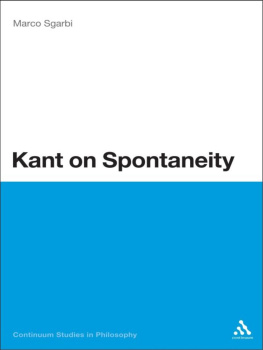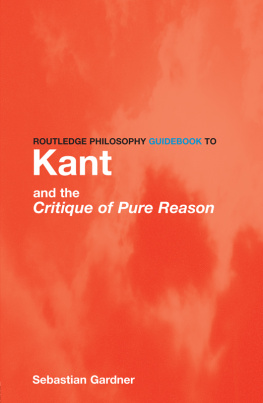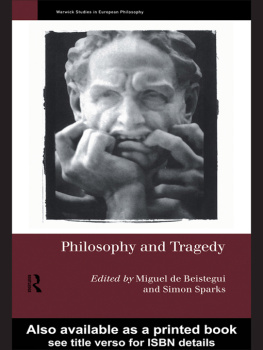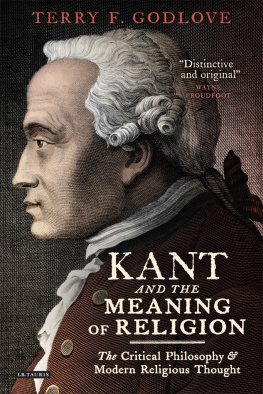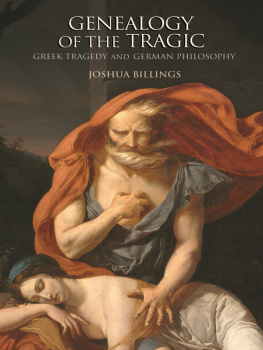The Tragedy of Philosophy
SUNY series in Contemporary Continental Philosophy
Dennis J. Schmidt, editor
The Tragedy of Philosophy
Kants Critique of Judgment and the Project of Aesthetics
Andrew Cooper
Published by State University of New York Press, Albany
2016 State University of New York
All rights reserved
Printed in the United States of America
No part of this book may be used or reproduced in any manner whatsoever without written permission. No part of this book may be stored in a retrieval system or transmitted in any form or by any means including electronic, electrostatic, magnetic tape, mechanical, photocopying, recording, or otherwise without the prior permission in writing of the publisher.
For information, contact State University of New York Press, Albany, NY
www.sunypress.edu
Production, Emily Keneston
Marketing, Kate Seburyamo
Library of Congress Cataloging-in-Publication Data
Names: Cooper, Andrew,
Title: The tragedy of philosophy : Kants critique of judgment and the project of aesthetics / Andrew Cooper.
Description: Albany : State University of New York Press, 2016. | Series: SUNY series in contemporary Continental philosophy | Includes bibliographical references and index.
Identifiers: LCCN 2015042621 (print) | LCCN 2016028395 (ebook) | ISBN 9781438461892 (hardcover : alk. paper) | ISBN 9781438461908 (e-book)
Subjects: LCSH: Kant, Immanuel, 17241804. | Kant, Immanuel, 17241804. Kritik der Urteilskraft. | Judgment (Aesthetics) | Aesthetics. | Tragedy. | Philosophy of nature.
Classification: LCC B2798.C757 2016 (print) | LCC B2798 (ebook) | DDC 111/.85092dc23
LC record available at https://lccn.loc.gov/2015042621
10 9 8 7 6 5 4 3 2 1
nothing conclusive has yet taken place in the world, the ultimate word of the world and about the world has not yet been spoken, the world is open and free, everything is still in the future and will always be in the future.
Mikhail Bakhtin, Problems of Dostoevskys Poetics
Contents
Preface
To consider Kant as a thinker of tragedy is to embark on a controversial project. My aim in this book is to contribute to the growing interest in a side of Kant that has often been overlooked, namely, his sensitivity to humanity as an organic form of beingas a part of natureendowed with the visceral capacity for feeling pleasure and displeasure that, on a level that precedes cognition, promotes the continuity of life. In Critique of Judgment , the capacity for feeling pleasure and displeasure constitutes a bridge between the two facets of experience that permeate Kants work: the experience of nature as an already constituted region of causality, and of ourselves as moral, free beings. The need for this project became apparent to me somewhat tangentially as I discovered the burgeoning philosophical literature on Greek tragedy. This literature suggests that the paradigm of nature often assumed in philosophy and the natural sciences misconstrues the natural sphere as a domain that can be mastered by human knowledge. It searches for a more complex and multifaceted paradigm of nature in the tragedies of Aeschylus, Sophocles, and Euripides and the subsequent tradition in philosophy inspired by their work.
What was of particular interest to me in this literature is that it attempts to salvage a dynamic picture of nature from within philosophy itself; that is, from a tragedy that is specific to philosophical inquiry, or The Tragedy of Philosophy , as I refer to in the title of this book. It considers the work of Kant, and his presentation of an impassable barrier between natures order and human spontaneity, as expressive of philosophys systematic attempt to hold the fixity of metaphysics apart from organic vitality. From this point the literature bifurcates: one side argues that Kants presentation of this barrier opens his successors to the task of reconciling the duality of human experience in a single picture of nature; the other claims that Kants failed attempt to salvage philosophy reveals that philosophy itself must be abandoned in favor of the mode of thinking expressed by the ancient tragedians, one attuned to particularity and difference.
While I share the conviction that we require an expansive picture of nature capable of holding human spontaneity in genuine union with natural events, I begin by arguing that these representations of Kant misread the relation between philosophy and tragedy. This is not least for the reason that they portray tragedy as a form of presentation that is, for philosophys contemporary concern, lifeless and dead. My aim is thus to provide an alternative representation of Kant that highlights the organic relation between tragedy and philosophy. Building from Kants acknowledgment of the failures of philosophy in the eighteenth century, I claim that tragedy is an ongoing problematic in philosophy that opens an experience of nature in union with human spontaneity. Thus understood, Kants Critique of Judgment represents a sustained engagement with the tragedy of philosophy; my aim is to show that this engagement is not surpassed but rather extended in the work of philosophers who continue the project of aesthetics.
I received a great deal of support in developing this project. I am particularly grateful to my doctoral supervisors John Grumley and Vrasidas Karalis, who helped me to see research in the history of philosophy as a creative engagement with the present. Countless hours spent in conversation with Vras taught me to embrace the specificity of human life over and against theorization, particularly when it comes to tragedy. I would also like to thank those who patiently read the manuscript and provided invaluable comments, including Paul Redding, Dennis Schmidt, Richard Eldridge, Jonathan Dunk, and Yarran Hominh. I am grateful for the time and effort they put into my writing, and I hope they feel that the book is greatly improved as a result. To Denny in particular, your belief in my work means more to me that I can say. I received encouragement from many others at key stages of this project, including Simon Critchley, Jeff Malpas, Julian Young, and Nathan Lyons. Their contributions have added considerable depth and clarity to my work. I am also thankful for the reports provided by my anonymous reviewers, which offered insightful suggestions I have attempted to include in the book. At SUNY Press Andrew Kenyon has been an incredibly efficient editor and a constant source of support, and Emily Keneston has been equally helpful in seeing the book through its various stages to production. My thanks go also to Markus Gabriel, for hosting me in the lively philosophy faculty at the University of Bonn during the final stages of writing. And this project would not have been possible at all without the financial support of several generous sources, including the Australian government, the University of Sydney, St Pauls College, and the Deutscher Akademischer Austauschdienst (DAAD).
Perhaps the greatest source of inspiration for this book came from the lives and stories of homeless young people in Sydney with whom I have worked during the past eight years. It was through conversations with homeless youth that I became interested in the idea of tragedy as a way of framing the competing demands of human experience. And it was through these conversations that I became discontent with theories of tragedy that end in the satisfaction of the spectator rather than in action. The remarkable courage of homeless youth taught me that freedom does not lie beyond our material conditions, but within them. My thanks go to them, and to the team at The Bridge Youth Refuge, for giving me the opportunity to learn that effective practice begins with discovering ones own homelessness.

